All You Need To Know to Choose Your Perfect Pool
Choosing the right pool involves understanding the types available, costs, and other key factors. Here, we’ll answer some of the most common questions to help you make an informed decision.
Types of Pools
1. What are the differences between above-ground and in-ground pools?
Above-ground pools are typically more affordable and easier to install. They come in various shapes and sizes and can be a great option for smaller yards or temporary installations. In-ground pools, on the other hand, are permanent fixtures that can significantly enhance your property. They offer more design options, including various depths and shapes, and can be customized with features like waterfalls and lighting.
2. How do fiberglass, concrete, and vinyl liner pools compare?
- Fiberglass pools: These are pre-made shells that are lowered into a hole. They are quick to install and low-maintenance, with a smooth surface that resists algae.
- Concrete pools: These offer the most customization in terms of shape and size. They are very durable but require more maintenance and can take longer to install.
- Vinyl liner pools: These pools have a custom-made vinyl liner that fits into a pre-built frame. They are less expensive than concrete pools and offer a smooth surface, but the liner must be replaced every 5-10 years.
3. What are the options for indoor vs. outdoor pools?
Indoor pools offer the advantage of year-round swimming and protection from the elements, making them ideal for colder climates. They also provide privacy and can be integrated into the home’s design. Outdoor pools, meanwhile, are perfect for warm climates and can be designed to enhance your backyard with landscaping, decking, and other features.
Budget and Costs
1. What is the average cost of different types of pools?
- Above-ground pools: Typically range from $1,500 to $5,000.
- Fiberglass pools: Usually cost between $20,000 and $40,000.
- Concrete pools are the most expensive, ranging from $30,000 to $60,000 or more.
- Vinyl liner pools: Generally cost between $20,000 and $35,000.
2. What are the installation costs and potential hidden fees?
Installation costs can vary widely based on the type of pool, the complexity of the installation, and your location. It’s important to account for:
- Site preparation: This can include excavation, grading, and landscaping.
- Permits and inspections: Required by local authorities.
- Additional features: Such as decking, fencing, and pool covers.
- Electrical and plumbing work: For pumps, heaters, and lighting.
3. What are the maintenance costs over time?
- Fiberglass pools: Low maintenance, costing around $500 annually.
- Concrete pools: Higher maintenance due to the need for resurfacing every 10-15 years, costing up to $2,000 annually.
- Vinyl liner pools require moderate maintenance, with liner replacement every 5-10 years, costing about $1,500 annually.
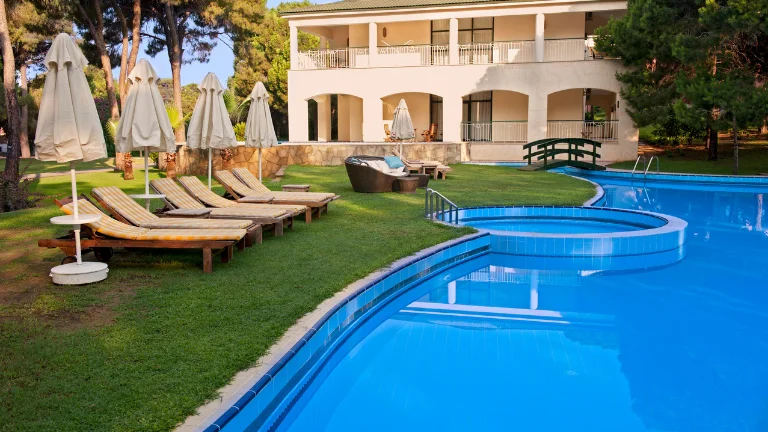
Check out the Related article: Plunge Pool Hot Tub Combo
Features and Accessories
1. What are popular pool features like waterfalls, slides, and lighting?
Many pool owners add features like waterfalls, slides, and lighting to enhance their pool experience. Waterfalls create a relaxing ambiance, slides add fun for families with children, and lighting allows for evening swims and can add a beautiful aesthetic to your pool area.
2. What are some safety features like pool covers and fencing?
Safety is crucial for any pool owner. Pool covers help prevent accidents and keep debris out of the water. Fencing around the pool area can prevent unauthorized access and is often required by local regulations to ensure child safety.
3. What are the heating options and pool covers for year-round use?
Several options exist to keep your pool warm throughout the year, including solar heaters, gas heaters, and heat pumps. Pool covers can also help retain heat and reduce evaporation, making your pool more energy-efficient.
Design Considerations
1. What are the pool shapes and designs that suit various yard sizes?
The shape and design of your pool should complement your yard size and layout. Rectangular pools are great for larger spaces and lap swimming, while kidney-shaped or freeform pools can fit more naturally into smaller or irregularly shaped yards.
2. How can you integrate pools with landscape designs?
Integrating your pool with your landscape design can create a seamless and attractive outdoor space. Consider surrounding your pool with plants, rocks, and lighting to create a natural look, and add pavers or decking to enhance the pool area.
3. What are the decking options and poolside amenities?
Various decking options include concrete, wood, and composite materials. Each has its pros and cons regarding cost, maintenance, and appearance. Poolside amenities like loungers, umbrellas, and outdoor kitchens can enhance your living space.
Regulations and Permits
1. What are the local regulations regarding pool installation?
Local regulations for pool installation can vary, so it’s important to check with your local government. Regulations may include setback requirements, barrier requirements, and safety standards to ensure the pool is safely constructed.
2. What permits and inspections are necessary?
You will likely need several permits, including building and electrical permits, before installing a pool. Inspections during and after installation ensure that the pool meets all safety and building codes.
3. What are zoning laws and homeowner association rules?
Zoning laws can affect where you can place your pool, while homeowner association rules may dictate specific pool design and maintenance requirements. It is important to review these rules to avoid any issues during the installation process.
Construction and Installation
1. What is the timeline for pool installation?
The timeline for pool installation can vary based on the pool type and the project’s complexity. Above-ground pools can be installed in a few days, while in-ground pools may take several weeks to a few months, depending on the design and weather conditions.
2. What are the steps involved in pool construction?
The steps involved in pool construction typically include:
- Design and planning: Deciding on the pool type, size, and features.
- Permitting: Obtaining the necessary permits from local authorities.
- Excavation: Digging the hole for the pool.
- Installation: Installing the pool shell or constructing the pool walls and floor.
- Plumbing and electrical: Installing the necessary systems for water circulation and heating.
- Finishing: Add the liner, tiles, or plaster, and fill the pool with water.
- Landscaping and decking: Completing the surrounding area with desired features.
3. How do you choose a reputable contractor?
Choosing a reputable contractor is crucial for a successful pool installation. Look for contractors with:
- Experience and credentials: Verify their experience with similar projects and check for necessary licenses or certifications.
- References and reviews: Ask for references from past clients and read online reviews.
- Transparent pricing: Get detailed quotes and compare prices to ensure a fair deal.
- Good communication: Ensure the contractor communicates clearly and responds promptly to your questions and concerns.
Where to Buy
1. What are the best places to buy pools?
The best places to buy pools include specialized pool stores, home improvement stores, and online retailers. Some popular options are:
- Local pool supply stores: Offer personalized service and expert advice.
- Home improvement stores, Such as Home Depot and Lowe’s, have a wide selection of pools and accessories.
- Online retailers Like Amazon and Wayfair offer a broad range of products and convenient delivery options.
2. Who are reputable pool manufacturers and retailers?
Some reputable pool manufacturers and retailers include:
- Intex: Known for affordable above-ground pools.
- Hayward: Offers a variety of pool equipment and accessories.
- Pentair: Known for high-quality pumps and filters.
- Leslie’s Pool Supplies: A reliable retailer with a wide selection of products and knowledgeable staff.
3. What are the pros and cons of online vs. in-store purchasing options?
- Online purchasing:
- Pros: Convenience, often better prices, and a wide selection.
- Cons: Lack of personalized service and the inability to see the product before purchasing.
- In-store purchasing:
- Pros: Personalized service, ability to see and touch products, and immediate availability.
- Cons: Limited selection and potentially higher prices.
Reviews and Recommendations
1. What are the reviews of popular pool brands and models?
- Intex Ultra Frame Pool: This pool is highly rated for its durability and ease of assembly, making it a popular choice for above-ground pools.
- Hayward Aqua Rite Salt Chlorination System: Praised for its efficiency in maintaining pool water quality.
- Pentair IntelliFlo Variable Speed Pump: Known for its energy efficiency and quiet operation.
2. What are some recommendations for pool accessories and maintenance equipment?
- Robotic pool cleaners, Such as the Dolphin Nautilus CC Plus, are efficient and require minimal effort.
- Pool covers: Like the Blue Wave Rectangular In-Ground Pool Safety Cover, recommended for safety and maintenance.
- Water testing kits, Such as the Taylor K-2006, are essential for maintaining proper water chemistry.
You can easily find specific brands and retailers using these resources, ensuring you get the best products and services for your pool needs. For more tips on outdoor living and relaxation, visit Hot Tub Patio.
Comparisons and Reviews
1. How can I compare different types of pools and their features?
To compare different types of pools, you can start by looking at the key features of each type:
- Above-Ground Pools:
- Features: Portable, easier to install, less expensive.
- Pros: Lower cost, quicker installation.
- Cons: Less durable, limited design options.
- In-Ground Pools:
- Features: Permanent, customizable, higher cost.
- Pros: Long-lasting, adds value to the property, more design options.
- Cons: Higher initial cost means longer installation time.
- Fiberglass Pools:
- Features: Pre-made shells, quick installation, low maintenance.
- Pros: Smooth surface, resistant to algae, quick to install.
- Cons: Limited shapes and sizes, higher upfront cost.
- Concrete Pools:
- Features: Highly customizable, durable, versatile designs.
- Pros: Custom shapes and sizes are very durable.
- Cons: High maintenance and longer installation time.
- Vinyl Liner Pools:
- Features: Custom-made liners, smooth surface.
- Pros: Lower cost than concrete, customizable.
- Cons: Liner needs replacement every 5-10 years, susceptible to punctures.
2. Where can I read detailed product reviews and customer feedback?
For detailed product reviews and customer feedback, consider the following resources:
- Amazon: Offers a wide range of products with customer reviews and ratings. Visit Amazon Pools.
- Yelp: Provides reviews and ratings for local pool suppliers and installers. Check Yelp Pool Reviews.
- Google Reviews: Search for specific pool brands and retailers to find customer reviews.
- Consumer Reports: Offers unbiased reviews and ratings of pool products and equipment. Visit Consumer Reports Pools.
3. How can I investigate warranty options and customer service?
To understand warranty options and customer service, follow these steps:
- Manufacturer Websites: Visit the official websites of pool manufacturers to read about their warranty policies. For example:
- Intex Warranty Information
- Hayward Warranty
- Pentair Warranty
- Customer Service Reviews: Read customer reviews on sites like Yelp and Google to get an idea of the quality of customer service provided by different companies.
- Contact the Manufacturer: Call or email customer service departments to ask specific questions about warranty coverage and support.
Pool Maintenance Cost
The average annual cost for pool maintenance in the USA is $1,430, ranging from $1,065 to $1,800. This includes the cost of cleaning, chemicals, and minor repairs. Depending on the size and type of pool, the climate, and the frequency of maintenance.
- Above-ground pools: $50-$100 per month
- In-ground pools: $80-$150 per month
- Inflatable pools: $20-$50 per month
Vary depending on the following factors:
- Size of the pool: Larger pools require more time and chemicals to maintain.
- Type of pool: Saltwater pools require less maintenance than chlorine pools, but they may require the salt cell to be replaced every few years.
- Climate: Pools in warmer climates require more maintenance than pools in cooler climates.
- Frequency of maintenance: Pools that are used more often require more maintenance.
Check out our Related article: Find Out Which Pool Plaster Colors Is Right For You!
Tips to Save Money on Pool Maintenance
Use a Cover and Reduce Chlorine Usage
To save money on pool maintenance, you can use a cover to reduce debris and clean less frequently. Also, installing a saltwater system can help reduce the amount of chlorine needed.
Regular Filter Maintenance: Regularly checking and cleaning your pool filter can also help save money on maintenance.
Average Maintenance Costs: The cost of maintaining a pool varies based on its size, filtration system, and frequency of maintenance.
Considerations for Pool Installation:
Location:
When installing a pool, consider local laws and regulations regarding size, shape, and type. If you have limited space, consider alternatives, like building a deck over the water.
Indoor or Outdoor Pool: Choosing between indoor and outdoor pools depends on climate and maintenance preferences. Indoor pools are easier to maintain but require more testing and treatment for water quality. A smaller indoor pool may require less maintenance.
Final Thoughts:
Choosing the perfect pool can be challenging, but it doesn’t have to be. There are many options to choose from; the first step is determining the type of pool. Want a fiberglass pool with a ton of bells and whistles? Or are you looking for something a little simple?
There are many factors to consider when choosing the perfect pool, but once you figure out what you want, it will be much easier to start comparing prices and looking for the best deals.
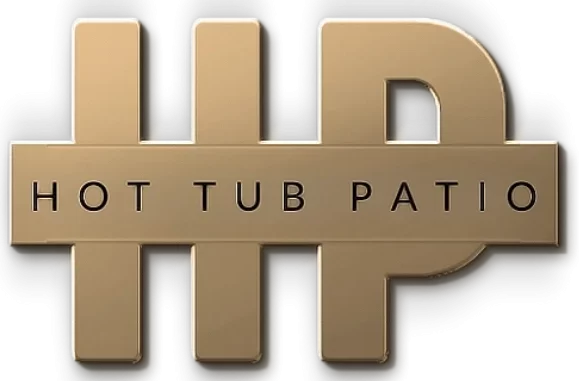
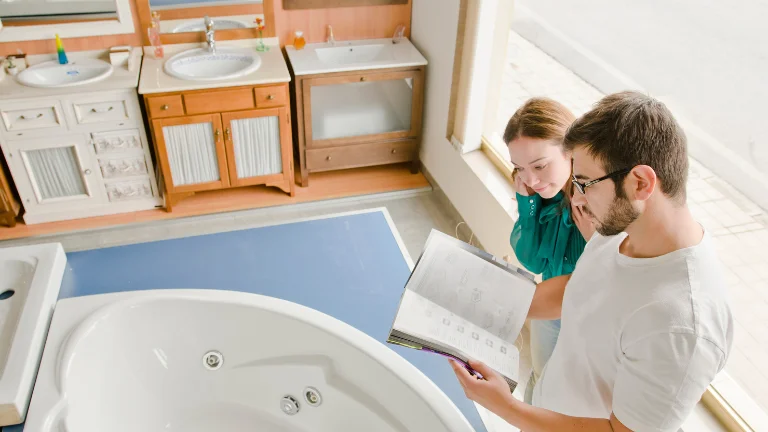





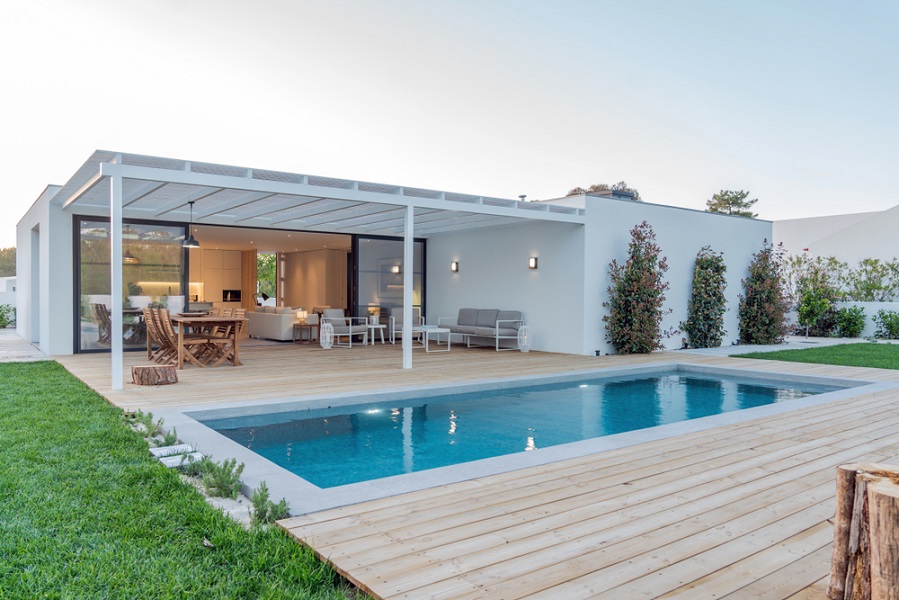
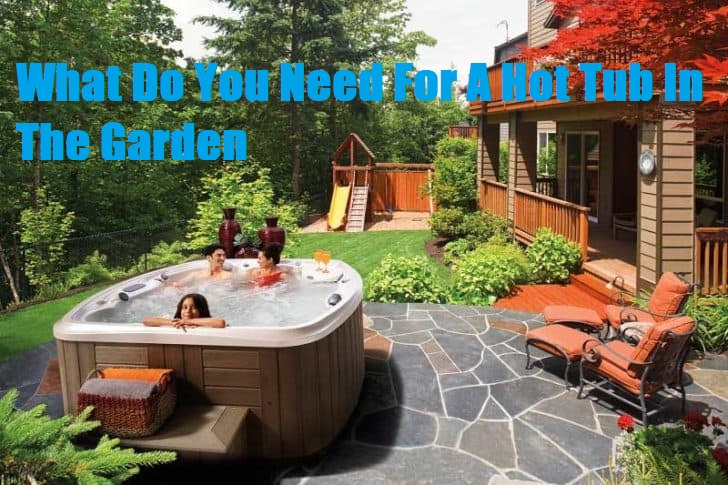

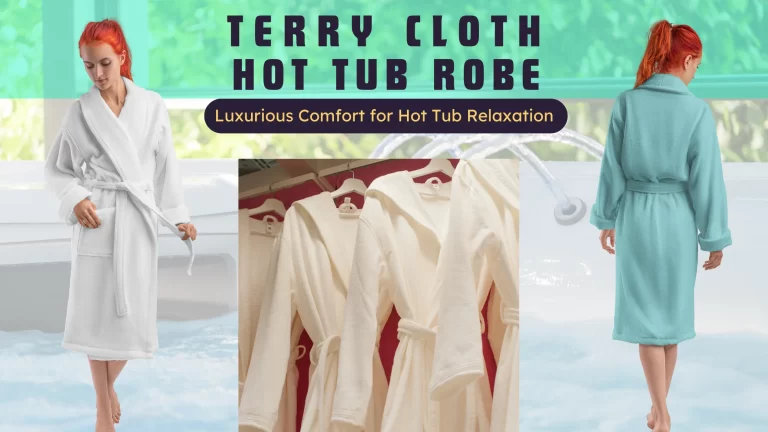
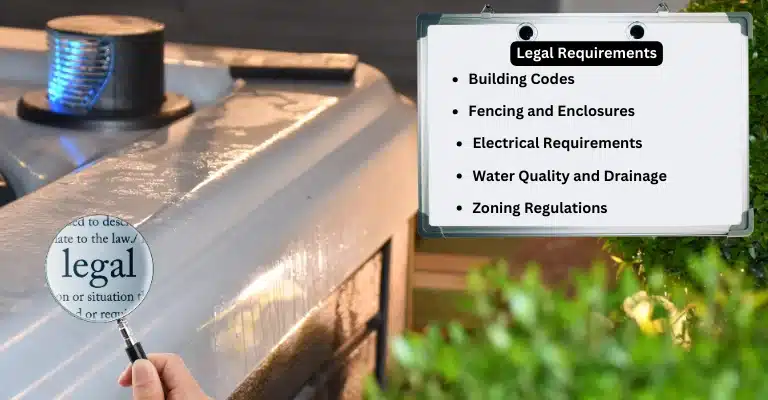
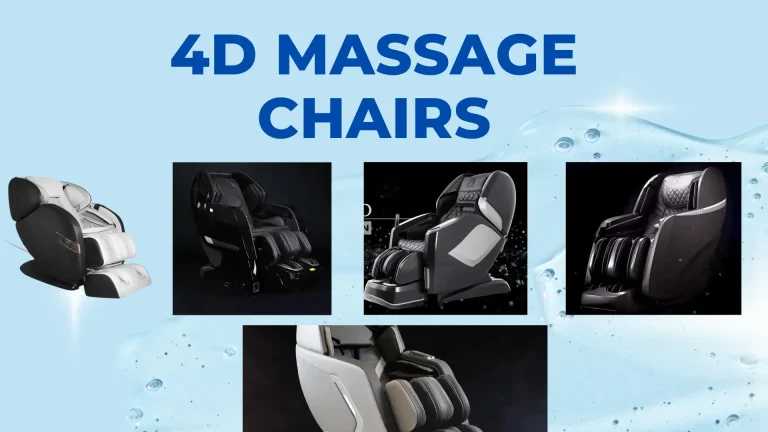

7 Comments